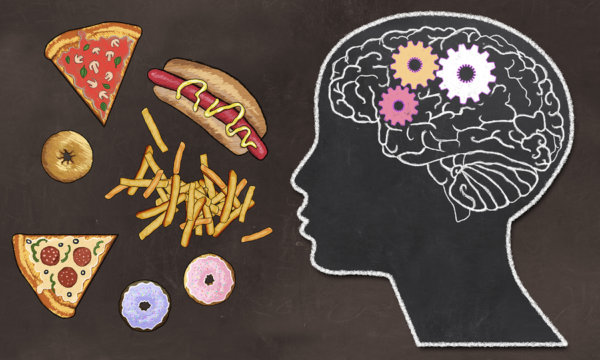
Recently, the Center on Addiction released a report that examines how our knowledge of the causes and mechanisms of substance abuse might help to increase our understanding of excessive eating, which is a significant health concern and challenge many in the U.S. must face.
The mounting obesity epidemic across the country has prompted researchers to investigate how individual vulnerabilities interact with the current food environment and lead to unhealthy overeating. As a result, food addiction has become a new field of experimental study, with researchers analyzing these eating behaviors and patterns within the context of addiction.
The report identified factors, defining symptoms and biological mechanisms of food addiction and how these overlap with other eating disorders and substance abuse.
What Is Food Addiction?
Food addiction has been defined as a clinically-significant dependence, which may be both psychological and physical, on fatty, sugary, and highly palatable foods. While it is not recognized as a disorder in the Diagnostic and Statistical Manual of Mental Disorders (DSM), it can be measured and evaluated using the Yale Food Addiction Scale. This is an instrument based on diagnostic criteria in the DSM for substance dependence.
Although the study of food addiction has just occurred relatively recently, much has been discovered about this form of unhealthy eating patterns and their relationship to other forms of addictive behavior. It’s important to note, however, that not all overweight people eat in ways that mirror an addiction or eating disorder, and not all people who meet the criteria for food addiction are overweight. Instead, these are complex human conditions that partially overlap and require customized interventions.
The knowledge obtained from years of research, intervention, and work in substance abuse may be beneficial in managing food addiction, as well as the food environment in the U.S.—which is one that contributes to unhealthy eating and a myriad of life-threatening and expensive health outcomes. The addiction context also might be helpful in addressing the stigma and challenges that people with food addiction and certain eating disorders have in managing a significant threat to their health and emotional well-being.
Similarities Between Food Addiction and Substance Abuse
A growing body of evidence reveals remarkable similarities between food addiction and substance addiction, including the following:
Effects on the Brain’s Reward System

The American Society of Addiction Medicine, the country’s largest professional community of physicians committed to treating and preventing addiction, has adopted a broad definition of addiction. This definition encompasses not only drugs and alcohol but also behavioral addictions, such as food, sex, and gambling. Moreover, the effects that substances and behaviors have on the brain are very similar.
Drugs, alcohol, and, to a lesser extent, processed foods inundate the brain with the feel-good neurochemical dopamine, affecting the regions responsible for feelings of pleasure and self-control. Over time, the function and structure of the brain changes, and dopamine receptors are reduced. This effect results in drugs, food, and other substances becoming less enjoyable but still wildly desired.
Intense Cravings
As a result of brain changes, compulsive overeaters may find themselves craving sweet, salty, high-calorie foods not unlike how a heroin addict craves their next high. In animal research, rats given access to a sugary drink exhibited addictive behaviors such as bingeing when sugar was available. In a study by scientists at Yale University, the mere sight of a milkshake could activate the same reward centers of the brain as cocaine among those with addictive eating habits.
According to some experts, food can be considered even more addictive than crack. Less than 20% of people who use drugs such as cocaine and heroin develop a full-blown addiction, while two-thirds of U.S. adults are overweight or obese.
Tolerance and Withdrawal
Key symptoms of addiction include tolerance, dependence, and withdrawal. Tolerance occurs when a person needs increasingly large doses of a substance to experience the desired effects. When dependence has developed, the body has adapted to a substance’s presence and is no longer able to function normally without it. This effect results in unpleasant withdrawal symptoms when a person abruptly stops using the substance or attempts to cut back.
In research, rats given fatty and sugary foods exhibited a powerful desire for larger amounts, along with withdrawal symptoms, such as anxiety and trembling, when the food was taken away. This result might help to explain why people who eat a lot of sugary or processed foods crave more of those products, even when they’re very motivated to alter their habits.

Denial
Just as a drug addict or alcoholic in denial will claim, “I can quit any time I want,” people with food addiction may state that they “just like to eat.” According to some research, Americans routinely underestimate the number of calories they consume and how much they weigh.
Repeated Attempts to Quit Have Failed
For both drug addicts and excessive eaters, willpower alone often isn’t enough to quit—many people who lose weight gain it all back, and sometimes even more. Without a change in coping mechanisms and lifestyle, both types of addicts are likely to make multiple attempts to quit engaging in addictive behaviors, only to be faced with relapse.
Stigma and Shame
The excessive use of substances or food can involve guilt, shame, and secrecy. Drug addicts frequently isolate themselves and withdraw from loved ones. Food addicts may conceal evidence of a binge, eat alone, and feel ashamed after eating, which encourages more compulsive eating. Many neglect once-enjoyable activities because they are embarrassed about their weight or obsessive eating habits. Although research shows that drug abuse carries a harsh stigma, weight bias is also prevalent in school, workplace, and health-care settings.
Continuing the Behavior Despite Adverse Consequences
Drug addicts and alcoholics will often continue to use even after they’ve lost nearly everything that matters to them. Although food addiction may not have dire costs such as a loss of loved ones or legal problems, overeaters often experience severe health problems related to obesity, heart disease, diabetes, and have an overall lower quality of life.
Prevalence of Co-Occurring Disorders
It is believed that at least half of all substance abusers also struggle with other mental health conditions. According to other research, it is also common for overeaters to have other mental health disorders such as depression. They are also much more likely than others to meet the criteria for binge eating.
Knowing all of this, it’s easy to see precisely why losing weight is so difficult for many people. The same factors that cause people to struggle with a lifelong battle with substance abuse are at play when we eat sugary, high-processed foods. And although there are undoubtedly clear differences between drug and alcohol addiction and excessive eating, the similarities have become increasingly hard to look past. If research regarding this continues, researchers may ultimately find that medications and behavioral therapies should play an even more key role in the treatment of food addiction and obesity.
Finally, it is worthwhile to note that process addictions, such as obsessive eating, and substance abuse often go hand-in-hand. The same brain changes, genetic propensities, and impulsive behaviors exhibited by those who suffer from either of these conditions may contribute to the development of the other.
Treatment for Food Addiction and Substance Abuse
Both food addiction and substance abuse can be treated with a combination of behavioral therapy, counseling, and group support. Medicated-assisted treatment such as anti-depressants and other pharmaceuticals can also be hugely beneficial for relieving symptoms associated with both conditions.
If you or someone you love is struggling with drug or alcohol addiction, as well as food addiction or another mental illness, contact Recovery By The Sea today!
READ THIS NEXT: Obsessive Love Addiction and Substance Abuse